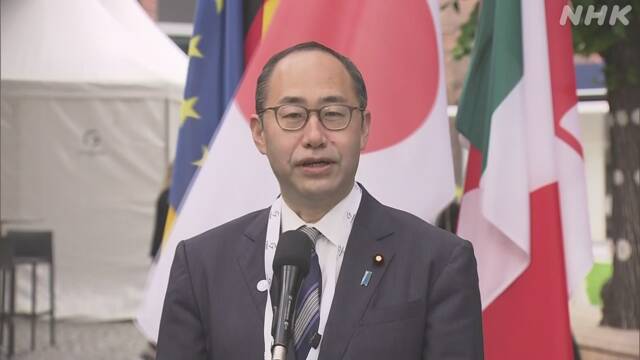G7 = Climate, Energy and Environment Ministers' Meeting of the Seven Major Countries has opened.
Following Russia's military invasion of Ukraine, one focus is on the ability to coordinately launch “de-Russia” actions in the energy sector.
The G7 Climate, Energy and Environment Ministers' Meeting kicked off on the 26th in Berlin, Germany.
From Japan, Deputy Minister Hosoda of the Ministry of Economy, Trade and Industry and Deputy Minister Ooka of the Ministry of the Environment are in attendance.
Prior to the meeting, Habeck, the Minister of Economy and Climate Protection, who is in charge of energy policy in Germany, the presidency, told reporters to secure stable energy after Russia's military invasion of Ukraine and to tackle climate change. He expressed his intention to discuss measures.
Following Russia's military invasion, G7 countries have already announced bans and gradual reductions in coal imports, and gradual or immediate bans on oil imports.
However, the specific time has not been specified.
Furthermore, European countries such as Germany and Italy are highly dependent on Russia for natural gas, and Japan also imports a certain amount of natural gas.
At the meeting, we will discuss how to reduce our dependence on Russian energy from the perspective of energy security.
The abolition of coal-fired power generation will also be on the agenda from the perspective of decarbonization.
Five of the G7 countries, including the United Kingdom and Germany, have already announced policies to abolish coal-fired power.
On the other hand, Japan, which has scarce resources, intends to explain its policy of utilizing coal-fired power by focusing on measures to reduce carbon dioxide emissions using new technologies.
Deputy Minister of Economy, Trade and Industry Hosoda "Insist on Japan's position"
Prior to the meeting, Kenichi Hosoda, Deputy Minister of Economy, Trade and Industry, responded to an interview with NHK, saying, "We will discuss issues for achieving both energy security and carbon neutrality. I would like to firmly insist on Japan's position. ".
Regarding the reduction of dependence on Russian energy as the G7, "There are various discussions at the G7 summit, but basically the policy of promoting" de-Russia "is the same. I would like to make it possible for each country to reach an agreement on what kind of timetable to proceed. "
Regarding the discussion on the abolition of coal-fired power generation, he asked each country for their understanding, saying, "There are various discussions on the handling of coal-fired power generation, but Japan has a policy of wanting to continue using it in a form that does not emit CO2." I showed the idea of going on.
Germany "Intensive discussion for the realization of decarbonization"
G7 = Before the start of the climate, energy and environment ministers' meeting of the seven major countries, Germany's chairman, Harbeck, the Minister of Economy and Climate Protection, told reporters that Russia's military invasion of Ukraine has led to energy stability. He said that he would discuss how to secure energy and how to respond to climate change.
"As a major industrialized country, there will be intensive discussions on whether the G7 can play a pioneering role in breaking away from coal and achieving decarbonization in the transportation sector," he said at this meeting. He expressed his willingness to deepen discussions on the realization of decarbonization, such as the abolition of coal.

